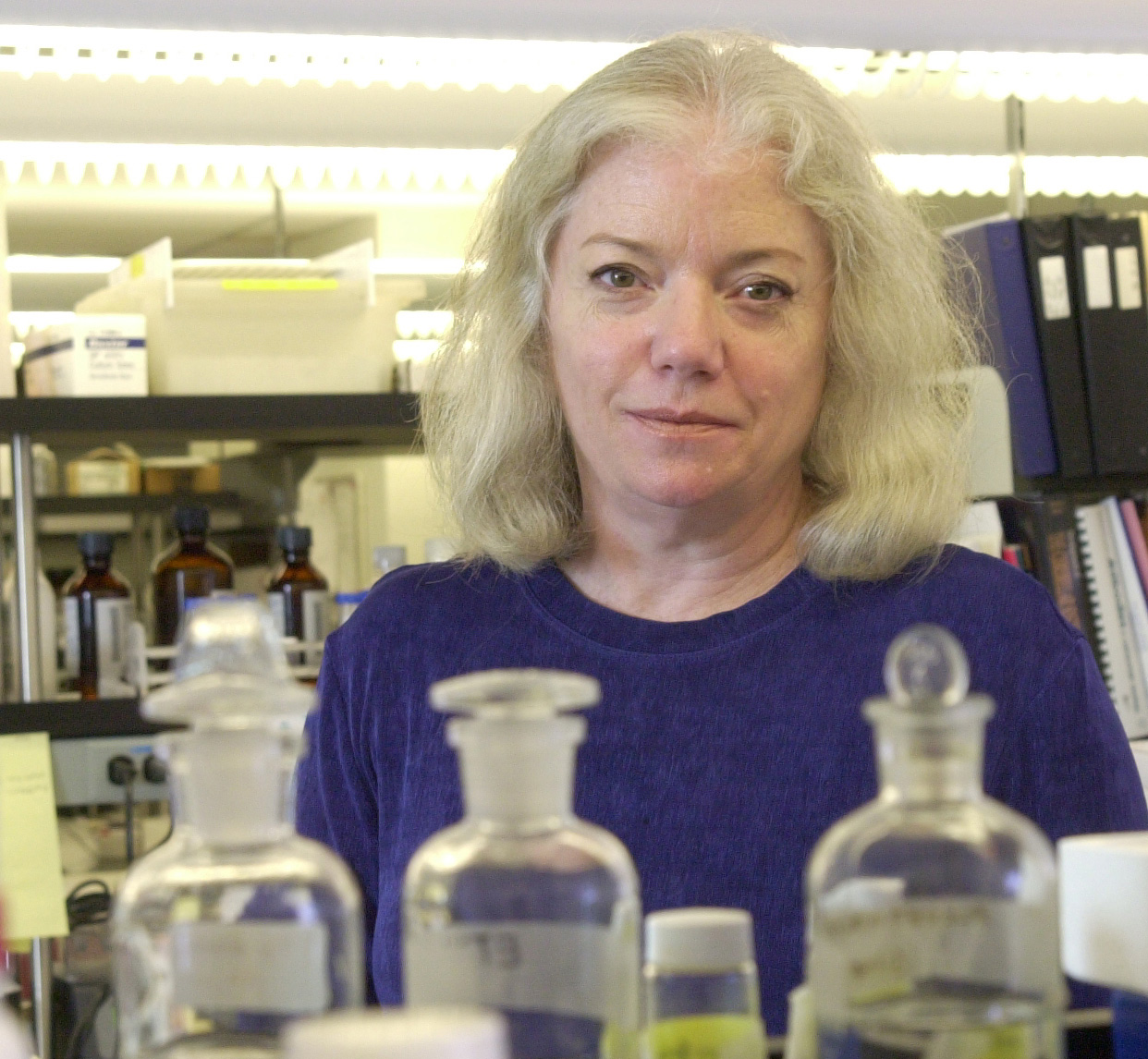- C. Sue Carter
Infobox Scientist

image_width = 150px
name = C. Sue Carter
birth_date =
birth_place =San Francisco ,California ,USA
death_date =
death_place =
residence =Chicago ,Illinois
nationality = flagicon|USA American
field =Biological Psychology
work_institution =University of Illinois at Chicago (professor)
alma_mater =University of Arkansas ,Fayetteville ,Arkansas ; USA
doctoral_advisor =
doctoral_students =
known_for = Characterizing the role of Oxytocin and Vasopressin in the Neurobiology of Monogamy and Love
prizes = American Association for the Advancement of Science
religion =
footnotes =C. Sue Carter is a biologist and behavioral neurobiologist. She is an internationally recognized expert in behavioral neuroendocrinology. She was the first person to identify the physiological mechanisms responsible for social
monogamy . [Winslow JT, Hastings N, Carter CS, Harbaugh CR, Insel TR. (1993) Central vasopressin mediates pair bonding in the monogamous prairie vole. Nature, 365:545-548.] [Insel TR, Carter CS. (1995) The monogamous brain. Natural History 104: 12-14.] Carter studies social bonding, male and female parental behavior, the social control ofstress reactivity and the social control of reproduction, often using animal models such as the socially monogamous prairie vole. Carter’s research focuses on neuropeptide and steroid hormones, includingoxytocin ,vasopressin , corticotropin-releasing hormone, andestrogen . Her research program has discovered important new developmental functions for oxytocin and vasopressin, and implicated thesehormones in the regulation of long-lasting neural and effects of early social experiences. [Carter, C.S. Ahnert, L. 2005. Attachment and Bonding: A New Synthesis. Cambridge, MA: MIT Press.] She also has a long-standing concern regarding the consequences of medical manipulations for human development and parent-child interactions, including the use of “pitocin” to induce labor and consequences of breast feeding for the mother and child. Most recently she has been examining the role of oxytocin and vasopressin in mental disorders such as autism, schizophrenia, anxiety and depression. [Goldman M, Marlow-O'Connor M, Torres I, Carter CS. (2008). Diminished plasma oxytocin in schizophrenic patients with neuroendocrine dysfunction and emotional deficits. Schizophrenia Research 98: 247-55.]Background
Carter studied biology at Drury College in Springfield, Missouri. She completed a PhD in Zoology at the
University of Arkansas in Fayetteville. In 2001 she joined the faculty of the College of Medicine at theUniversity of Illinois at Chicago , where she is currently Professor of Psychiatry and Co-Director of The Brain-Body Center.Carter is a Fellow of the American Association for the Advancement of Science and the International Behavioral Neuroscience Society (of which she is a past president).
She is married to
Stephen Porges , and has two children: Eric Carter Porges (currently a graduate student at theUniversity of Chicago in Integrative Neuroscience) and Seth Colin Porges (currently an Associate editor at Popular Mechanics Magazine in New York City).Academic achievements
Carter is best known for research on the physiological basis of social behavior, including studies that implicated oxytocin, vasopressin and hormones of the hypothalamic-pituitary-adrenal (“stress”) axis in the traits of monogamy including pair-bond formation. [Carter CS. (1992). Oxytocin and sexual behavior. Neuroscience and Biobehavioral Reviews, 16: 131-144.] She pioneered the physiological study of socially monogamous mammals, including the prairie vole. In collaboration with Lowell Getz, Carter documented the occurrence of social monogamy in prairie voles. She has been principal investigator on many NIH grants including a Program Project grant on the Developmental Effects of Oxytocin. Her studies in rodents helped to lay the foundation for the studies of behavioral and developmental effects of oxytocin and vasopressin in humans which are in progress. In collaboration with Margaret Altemus she conducted some of the first studies documenting the importance of breast-feeding in the regulation of maternal physiology. She has taken a leadership role in the new disciplines of Social and Integrative Neuroscience through the organization of conferences, workshops and volumes that have helped to define this field.
elected publications
* Carter CS, Getz LL. (1993). Monogamy and the prairie vole. Scientific American, 268,100-106.
* Carter CS, Keverne EB. (2002) The neurobiology of social affiliation and pair bonding. In Hormones, Brain and Behavior, Edited by D. Pfaff, pp. 299-337, San Diego: Academic Press.
* Carter CS. (2003) Developmental consequences of oxytocin. Physiology and Behavior, 79, 383-397.
* Carter CS. (2007) Sex differences in oxytocin and vasopressin: Implications for autism spectrum disorders? Behavioural Brain Research. 176, 170-186.
* Goldman M, Marlow-O'Connor M, Torres I, Carter CS. (2008). Diminished plasma oxytocin in schizophrenic patients with neuroendocrine dysfunction and emotional deficits. Schizophrenia Research 98, 247-55.
* Carter CS, Grippo A J, Pournajafi-Nazarloo H, Ruscio MG, Porges SW (2008). Oxytocin, vasopressin and social behavior. Progress in Brain Research, 170, 331-336.Books
* Carter, C. S. 1974. Hormones and Sexual Behavior. Dowden, Hutchinson, & Ross, Inc. In Benchmark Papers in Animal Behavior series.
* Carter, C. S., Lederhendler, I. I., and Kirkpatrick, B. 1997. The Integrative Neurobiology of Affiliation. Annals of the New York Academy of Sciences, Vol. 807. (Re-released by MIT Press, Cambridge, MA, 1999).
* Uvnas-Moberg, K., and Carter, C. S. 1998. Special issue of Psychoneuroendocrinology : Proceedings of a Conference Sponsored by the Wenner-Gren Foundation: Stockholm, Sweden entitled “Is There a Neurobiology of Love?”
* Cacciopo, J, Berntson, G.G., Adolphs, R, Carter, C. S., Davidson, J., McClintock, M.K., McEwen, B. S. Meaney, M. J., Schacter, D. L., Sternberg, E. M., Suomi, S.S., Taylor, S.E., 2002. Foundations in Social Neuroscience. A Bradford Book, MIT Press, Cambridge, MA.
* Carter CS, Ahnert L, Grossmann K, Hrdy SB, Lamb M, Porges SW, & Sachser N. (eds). (2005) Attachment and Bonding: A New Synthesis. Cambridge: MIT Press.ee also
*
Biological Psychology
*Psychiatry
*Biology
*Neuropeptides
*Neuroscience
*Love
*Evolution
*Social cognition References
External links
* University of Illinois at Chicago [http://www.uic.edu/index.html/]
* Sue Carter web page [http://www.psych.uic.edu/bbc/]
Wikimedia Foundation. 2010.
